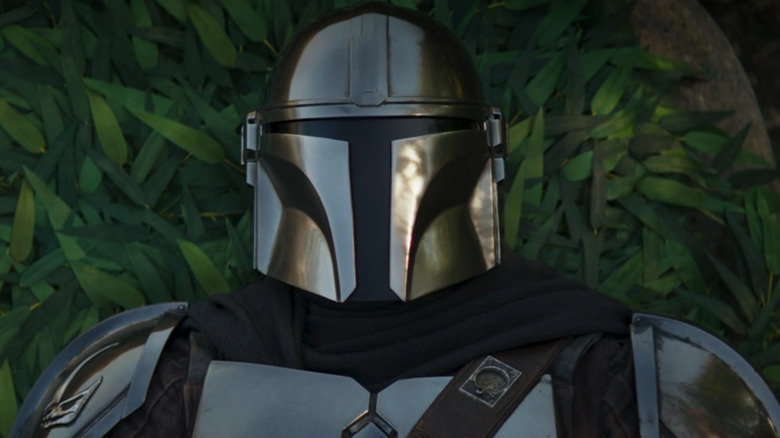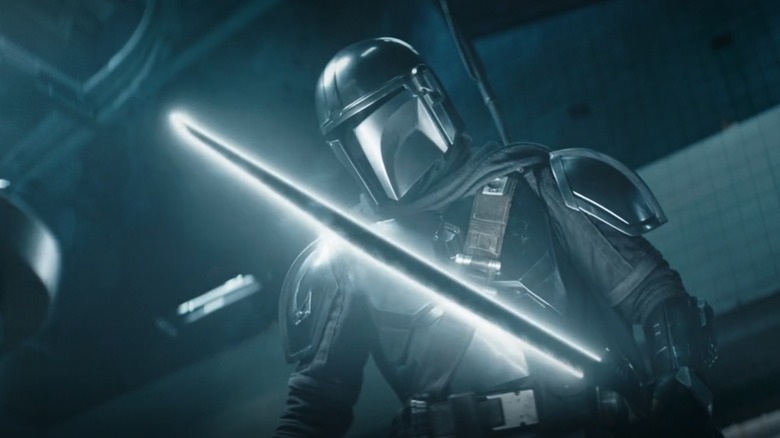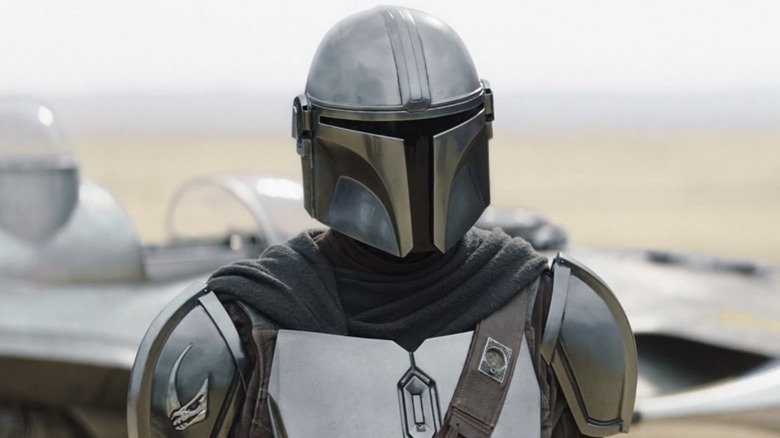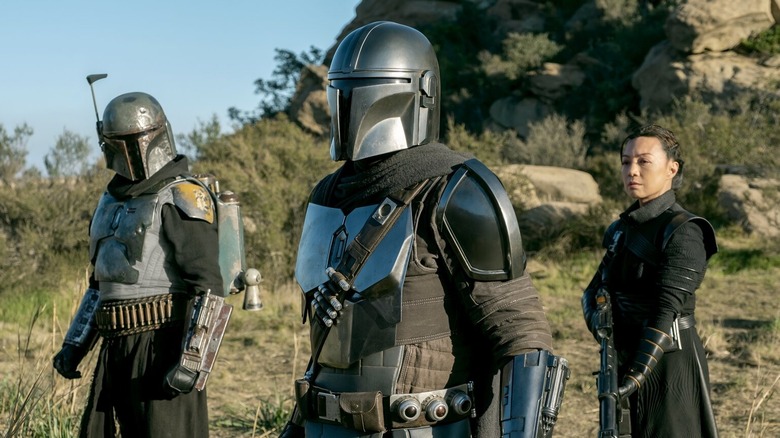The Mandalorian Vs. Boba Fett, Round 6: Storytelling Edition
We've been breezing along through "The Book of Boba Fett," and we finally have enough of a window into the series and its world to start making some bigger picture comparisons between it and that other "Star Wars" series that follows a helmeted space tank in the shape of a man, "The Mandalorian." Today's episode picked up where last week's Mando-centric episode left off, continuing Armored Space Dad's attempt to give Grogu a present to celebrate his first days at school. We got a window into the lil' green gent's Jedi training, and then it brought the action back to Tatooine to set up a rising confrontation with the mysterious Pyke Syndicate.
In previous editions of this face-off, we've looked at which bounty hunter is more iconic, more cuddly, or primed for better spin-off potential. We've seen which bounty hunter is better at a party, and which is better at different basic life skills. This week, we're digging into various elements of the two series' overall storytelling success as they pertain to the central protagonists and their narratives. Let's take a peek under the hood of both in our ongoing pursuit of an answer to the question, "Who is the better bounty hunter?"
Mando's series actually has narrative focus, unlike some bounty hunter series
"The Book of Boba Fett" is ostensibly about Boba Fett's journey from bounty hunter to Tatooine crime boss — or at least that's what we were led to theoretically expect by the series' own synopsis. In practice, it's been a much messier narrative ride than that, and it's finally time to talk about it. The series unsurprisingly begins by laboriously explaining how a bounty hunter-turned-sarlacc-snack survived, lost everything, then got his groove back. There's a lot of backstory there, but in its first two episodes, the series has difficulty balancing the past and the present. "Chapter 1: Stranger in a Strange Land" shows Fett making waves as he stakes claim to Jabba the Hutt's old turf before nearly being killed in an assassination attempt. The episode also highlights his earlier post-sarlacc troubles when he finds himself in Tusken Raider captivity. Episode 2 spends the first third of its 45-minute runtime remembering he was nearly killed, then we're back in the past in a long segment with few thematic connections to our protagonist's present issues. In episode 3, he builds a team of edgy youths to gain some soldiers. In episode 4, we see the return of his ship, the start of his relationship with Fennec Shand, and his appeal to other crime bosses to stay neutral in a war versus the Syndicate. Episode 5 is a surprising stealth episode of Season 3 of "The Mandalorian" in a Mando-only outing, continuing into this week's Mando-Grogu follow-up entry in episode 6.
For a series showing Boba Fett's supposed rise to power, it interrupts its present-day story all the time, barely remembering it in the first two episodes, making little progress in the third and fourth, and then effectively becoming episodes of an almost different story in the last two. "The Mandalorian," by contrast, is laser-focused throughout. The entire series orients around Mando's cute baby friend who is being hunted for nefarious reasons. In every episode, Mando traipses across the galaxy to keep Grogu safe, gaining friends and allies through a series of small favors on his journey. Almost every scene in every episode reinforces that journey, and even in these two Very Special Episodes of "The Book of Boba Fett," we see Mando centrally preoccupied with Grogu's safety with his drive to gift the little one a tiny set of Mandalorian jammies. One series comes to a fine point like Mando's very own Darksaber, while the other frantically darts around like Grogu jumping on river's rocks. Point goes easily to Mando.
Mando's series has greater consistency in its genre feel
With "The Book of Boba Fett" flitting to and fro so frequently, it has undoubtedly hampered its ability to keep a consistent genre feel thus far. We're led to believe we are watching Fett's rise to power, but the show struggles to balance his crime boss aspirations with his time with the Tusken Raiders, becomes "The Fast and the Furious: Tatooine Drift" in its third episode, and transitions into a full-blown "Mandalorian" territory with its space ronin vibes in the past two episodes. (Not to mention spending five minutes with Cobb Vanth makes it clear that there's a western spin-off we should be watching right now.) All this isn't saying "The Book of Boba Fett" is all bad, but genre-wise, it's all over the place.
Meanwhile, back at "The Mandalorian," we have a rogue bounty hunter seeking to care for a diminutive green foundling, and in the process saving folks from bandits (in "Chapter 4: Sanctuary"), facing Krayt Dragons (in "Chapter 9: The Marshal"), freeing a city from Imperial tyranny (in "Chapter 13: The Jedi"), and a horde of other threats in his pursuit of Grogu's safety. Taking inspiration from cinematic samurai classics like the "Lone Wolf and Cub" series of samurai films and "Seven Samurai" (in Chapter 4), "The Mandalorian" consistently has that principled Ronin-esque warrior feel that's threaded throughout samurai epics. It's so consistent, in fact, that even the Mando-centric episodes in Boba Fett's own series truly feel like episodes of the third season of "The Mandalorian," shuffled into "The Book of Boba Fett" instead of truly taking on the feel of their host series. It's another easy point for Mando here.
Mando and Boba Fett both have excellent character development
"The Mandalorian" and "The Book of Boba Fett" are, at least in one pivotal way, near opposites. Like Mando himself, "The Mandalorian" is laser-focused on Mando's present tasks. We have gotten some backstory over the course of its two seasons, but the focus in all instances is a direct service to the bounty hunter's current objectives. The past serves the present, and much of what we learn of Mando and his character stems from his goal-oriented choices, like risking his life to defend a New Republic lieutenant during the prison break in "Chapter 6: The Prisoner" (which ended up inadvertently saving Mando's life in "Chapter 10: The Passenger"). It's excellent, action-oriented character development, revealing Mando to have a full-fledged arc as he comes to love Grogu like his child, risk his skin for others, and live life as more than a series of bounties.
Examining Boba Fett's character development, it's clear on one hand that spending so much time in the past in "The Book of Boba Fett" has in many ways distracted from Boba Fett's present. The actual present-day story sometimes moves at the pace of a sarlacc digestive system, then gets further interrupted by shifting to Mando-led episodes. It's a show that's very preoccupied with its past, and at times that past has warred with its present-day narrative — and won. At the same time, the myriad flashbacks have provided substantial insight into who Boba Fett became since the original trilogy, given a deep window into Tusken Raider society, and explained Fennec Shand's loyalty to the hopeful crime boss. It's oddly structured but thoroughly interesting material that clearly shifts Boba Fett's character from the hardened bounty hunter of yore into someone interesting, even if it's not the someone we expected. This round must be a tie, since Mando's exemplary present-day development is matched by the depth of Boba Fett's past — despite the divergences in how that development is told on-screen.
Factoring in the tie in the third category, Mando walks away the winner of this round at 2:0. Stay tuned next time to answer questions like "Will Grogo wear his cute armor onesie?", "Where are all the Tatooine car washes?", or "What show even is this?"



